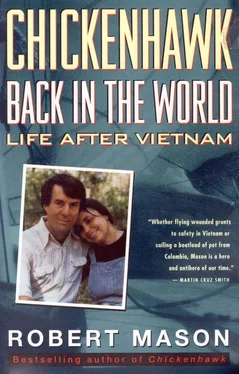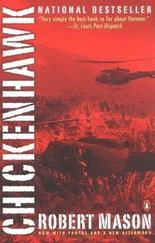Robert Mason - Chickenhawk - Back in the World - Life After Vietnam
Здесь есть возможность читать онлайн «Robert Mason - Chickenhawk - Back in the World - Life After Vietnam» весь текст электронной книги совершенно бесплатно (целиком полную версию без сокращений). В некоторых случаях можно слушать аудио, скачать через торрент в формате fb2 и присутствует краткое содержание. Год выпуска: 2013, Издательство: BookBaby, Жанр: Старинная литература, на английском языке. Описание произведения, (предисловие) а так же отзывы посетителей доступны на портале библиотеки ЛибКат.
- Название:Chickenhawk: Back in the World - Life After Vietnam
- Автор:
- Издательство:BookBaby
- Жанр:
- Год:2013
- ISBN:нет данных
- Рейтинг книги:3 / 5. Голосов: 1
-
Избранное:Добавить в избранное
- Отзывы:
-
Ваша оценка:
- 60
- 1
- 2
- 3
- 4
- 5
Chickenhawk: Back in the World - Life After Vietnam: краткое содержание, описание и аннотация
Предлагаем к чтению аннотацию, описание, краткое содержание или предисловие (зависит от того, что написал сам автор книги «Chickenhawk: Back in the World - Life After Vietnam»). Если вы не нашли необходимую информацию о книге — напишите в комментариях, мы постараемся отыскать её.
Chickenhawk: Back in the World - Life After Vietnam — читать онлайн бесплатно полную книгу (весь текст) целиком
Ниже представлен текст книги, разбитый по страницам. Система сохранения места последней прочитанной страницы, позволяет с удобством читать онлайн бесплатно книгу «Chickenhawk: Back in the World - Life After Vietnam», без необходимости каждый раз заново искать на чём Вы остановились. Поставьте закладку, и сможете в любой момент перейти на страницу, на которой закончили чтение.
Интервал:
Закладка:
I was stunned. Lehmann-Haupt seemed to get it, and I was happy that I’d gotten through.
To illustrate the power of the Times, at noon the same day the review came out a producer from the Today Show called. She wanted to know if I could be on the show. I said I’d have to check with Judge Blatt, I’d let her know. By two o’clock, People magazine and Time magazine had called to arrange interviews. By late in the day, a clerk from Sol Blatt’s office called me to say that the judge had no objection to me traveling to New York since it was part of my work, but, the clerk stressed, when I was assigned a date to go to prison I had to report immediately, no matter what television show I was scheduled to be on.
Suddenly everybody knew I’d written a book. Almost none of them knew I was also going to jail. None of the reviews mentioned my pending incarceration. The Today Show people found out when I told the producer that my trip was subject to clearance by a judge.
Towler insisted on flying down from Michigan to help out while all this was going on. He wanted to see what I was going to wear on television. I showed him a blazer I had bought years before in New York. Storage in our cabin had spawned several colonies of mildew. “You can’t wear that on the Today show!” Jerry insisted.
“Why not? Most of the stains are on the pocket and on the back. I’ll be sitting down.”
“C’mon, take me into town. You need something to wear. I’m not going to let you embarrass helicopter pilots.”
We went to J.C. Penny’s and Jerry helped me pick out a new blazer, some shirts, pants, and a tie. Knowing I had very little money, he insisted on buying this stuff for me.
That night Jerry brought out a box of slides he’d taken in Vietnam. We saw ourselves, two skinny kids again, filling sandbags for our bunker at Dak To; touring a village where a kid tried to sell me a dead baby; in the cockpit of our Huey; making coffee next to our helicopter in a rice paddy. Time travel. He showed a slide of me standing on smooth red clay, staring into the camera. I didn’t remember being there. Jerry said it was taken after the battle at Plei Me, didn’t I remember? No. I recognized that it was Plei Me; but I couldn’t remember the picture being taken. I couldn’t remember being there. Behind me were a score of Vietnamese bodies, men who’d been hit with 20mm cannon fire from strafing American fighters. They were eviscerated, beheaded, twisted, and horrible. I didn’t remember it at all. If it wasn’t for the slide, I’d still say I hadn’t been there. I wondered what else I’d forgotten.
We stayed up until early morning talking. I realized that Jerry and I had become brothers through our shared experience in that war.
The next day, when I did a book signing at Goering’s Bookstore in Gainesville, a Time photographer showed up, too. Jerry and Patience stood behind the photographer goofing it up to make me smile. I was feeling the exhilaration that comes from such attention. I’d never had so much recognition in my life.
Jerry left the next day, satisfied that I was prepared for my New York trip. He told Patience that if she needed anything, call.
The court called. I had to report to Eglin Federal Prison at Eglin Air Force Base, Florida, on Friday, August 19. I’d have just enough time to go to New York.
I flew to New York on Monday the fifteenth. I cabbed to the hotel where NBC puts up its talk-show guests. I had phone messages—a reporter from a paper in Texas, another from my childhood home area newspaper, the Palm Beach Post-Times, and several others. I did phone interviews for a couple of hours. Then I walked down the street to a restaurant to meet Gerry Howard and some other Viking Penguin people. I met my publicist, my copy editor, and the assistant publisher over a meal. I don’t recall what I ate. I don’t recall what I said.
After dinner, Gerry took me to a nice bar and wanted to know if I needed more money. I said an extra couple thousand’d be nice. He said, “How about another seventy-five hundred?”
At six-thirty Tuesday morning a young woman, a publicist, picked me up at the hotel and took me to the NBC studios.
I sat in a barber chair while a guy put makeup on my face.
I sat in the Green Room holding a cup of coffee, watching the monitor. The producer told me Bryant Gumbel had read most of my book. Over film clips of helicopters flying in Vietnam, a voice said, “Coming up, Robert Mason, author of the new best-selling book, Chickenhawk .”
“Where’d they get the best-selling bit?” I said.
The publicist shrugged. “Can’t hurt.”
I was so excited that I was beginning to lose track of reality. I followed a guy into the studio in an apprehensive trance. I sat in a chair behind a desk. The guy next to me leaned over and said he was Bryant Gumbel. “I know this is strange to you, Robert, but just try to act naturally.”
I nodded. Three huge television cameras stared at me. I saw a commercial playing on one monitor, Gumbel and me on another, and a close-up of my face on another. My eyes looked puffy, but my new blazer and tie looked okay. I saw a script roll through the prompters on the cameras, Gumbel’s lines. I realized then that millions of people, no exaggeration, were going to be watching. I had no lines.
Somebody said, “Five seconds, Bryant.” The camera light blinked red. Gumbel asked a question. I answered. We did this for five minutes. I don’t know what I said. I do remember the last question, though.
“Robert,” said Gumbel, “I understand something special is happening to you in a few days.”
I nodded. “Yes, Bryant. Friday I’m going to prison.”
CHAPTER 24
The prison had sent us a letter telling us what we were allowed to bring. I decided to take everything they allowed, whether I had it or not. I bought a bamboo flute and a tennis racket simply because I was allowed to have them.
People Magazine , interested in the writer-going-to-prison slant, sent writer David Chandler and photographer Lynn Pelham to interview me the day before I was due to report to Eglin. Pelham had me pack up a bag and walk out the door so they could show Patience and Jack waving good-bye: Dad marches off to jail. They promised they’d see me at Eglin to complete the story: Dad arrives at jail.
Patience and I drove over and picked up John and Alice and then drove a short distance to say good-bye to my parents. Dad had retired a few months before, had bought a little seven-acre farm near us, and puttered around growing vegetables and raising chickens, pigs, and cows.
My father was stoic, my mother was in tears. I told them I’d be back soon.
We drove two hundred miles to Fort Walton Beach and found a seaside motel. This was my treat. Gerry Howard had come through with more money against future royalties. They’d sold out the first printing of Chickenhawk (five thousand copies); we’d already made back my advance.
I wanted to spend my last night savoring freedom, eating a nice meal, making love. I couldn’t taste what I ate. I couldn’t seem to concentrate on anything. The fact that I was going to voluntarily walk into a prison the next day produced emotions too powerful to ignore. I felt like I had just before the assaults in Vietnam. I felt myself falling into a dark abyss.
The next day at noon, we drove to the main entrance of Eglin, the largest Air Force base in the world. The guard at the gate asked us what we wanted. I told him we were checking into prison.
The guard looked at me and smiled. “You the helicopter pilot? The guy who wrote the book?”
“Yep,” I said.
“Pleased to meet you, sir,” the guard said. He stood back and saluted. I returned the salute and drove on.
Читать дальшеИнтервал:
Закладка:
Похожие книги на «Chickenhawk: Back in the World - Life After Vietnam»
Представляем Вашему вниманию похожие книги на «Chickenhawk: Back in the World - Life After Vietnam» списком для выбора. Мы отобрали схожую по названию и смыслу литературу в надежде предоставить читателям больше вариантов отыскать новые, интересные, ещё непрочитанные произведения.
Обсуждение, отзывы о книге «Chickenhawk: Back in the World - Life After Vietnam» и просто собственные мнения читателей. Оставьте ваши комментарии, напишите, что Вы думаете о произведении, его смысле или главных героях. Укажите что конкретно понравилось, а что нет, и почему Вы так считаете.












